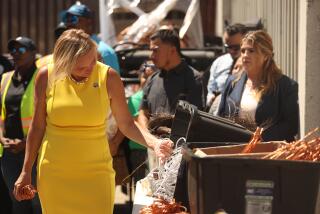Glendale to Charge for Research on City Records
- Share via
People who request information that requires extensive staff time from the Glendale city clerk’s office will have to pay for the service, the Glendale City Council decided this week.
Such research had been provided free, but the city now will charge $10 an hour for requests that require what officials consider unusual investigation. In addition, anyone who wants to listen to a tape recording of a public meeting will have to pay a minimum $5 setup fee plus $10 an hour.
The fees were approved Tuesday in a vaguely worded policy adopted by a 4-1 vote of the council. The dissenter was Councilman John F. Day, who questioned whether such charges might discourage the public from looking at public records.
City Clerk Merle Hagemeyer had asked for the fees, saying his office is receiving more and more requests for research, such as inquiries from homeowners trying to trace the history of zone changes in their neighborhoods. Hagemeyer said he has not kept records of the number of such requests, but said they take staff time away from normal duties.
Hagemeyer said his office will provide public documents at no charge but will assess fees if the staff is required to spend more than 30 or 45 minutes researching information.
No Time Limit Specified
The ordinance does not specify a time limit after which fees will be imposed. Day criticized the measure’s vagueness, saying that there should be “carefully drawn rules” specifying when charges will be levied.
Gardena, which adopted a similar policy last fall, has levied charges only twice, a spokesman for that city said.
The clerk’s office is the only source of public city records in Glendale, said City Manager James Rez. Some cities make copies of public records--such as ordinances and tape recordings of council meetings--available at local libraries, but Glendale does not.
Rez said it would be impractical for the city to duplicate records that date back to the city’s incorporation in 1906.
The city has only one master tape recording of public meetings. Consequently, a clerk must sit with anyone listening to a tape to ensure that it is not accidentally or purposefully erased or altered, Hagemeyer said. Under the new ordinance, listeners will be charged $10 an hour for the time that a clerk sits with them.
Experts on public policy said there is a trend among cities to charge the public for services provided. About 20% of the cities in California now charge similar user fees, they said.
In other action Tuesday, the council released $12,500 in city funds to the Glendale Junior Chamber of Commerce to stage the annual “Days of the Verdugos Parade” on Oct. 18. The council refused to issue funds earlier this month, putting the parade in jeopardy, because representatives of the Jaycees failed to attend council meetings to explain how the money would be spent.
Jaycees President William O’Brien apologized to council members this week, blaming a “communications foul-up.”
The council also adopted four reasons for granting Glendale Federal Savings & Loan permission to keep oversize signs on its landmark eight-story building at 401 N. Brand Blvd. The council approved the variance by a 4-1 vote on Aug. 5 but, by law, must give four reasons why the exception was granted. Final approval was delayed until the city attorney’s office drafted findings.
The council concluded that forcing the giant thrift to comply with the sign law would create practical difficulties and unnecessary hardship; that the signs have historical significance and are an integral part of the architecture; that they blend with the building and are not materially detrimental to the public welfare, and that they serve as “a beacon to the city.”
Councilwoman Ginger Bremberg voted against the variance and the findings, saying the action was unfair to other businessmen who were forced to comply.
Granting of the variance signalled the end of the city’s 3-year-old sign compliance program, in which 1,500 businesses were forced to change or take down illegal signs, city planning officials said. New business must adhere to the sign ordinance.
The council granted one other variance to the ordinance--to Seeley’s Furniture on the southern border to the city. Seeley’s was allowed to keep its red neon rooftop sign, which council members also ruled is historically significant and serves as a beacon to travelers.
More to Read
Sign up for Essential California
The most important California stories and recommendations in your inbox every morning.
You may occasionally receive promotional content from the Los Angeles Times.










